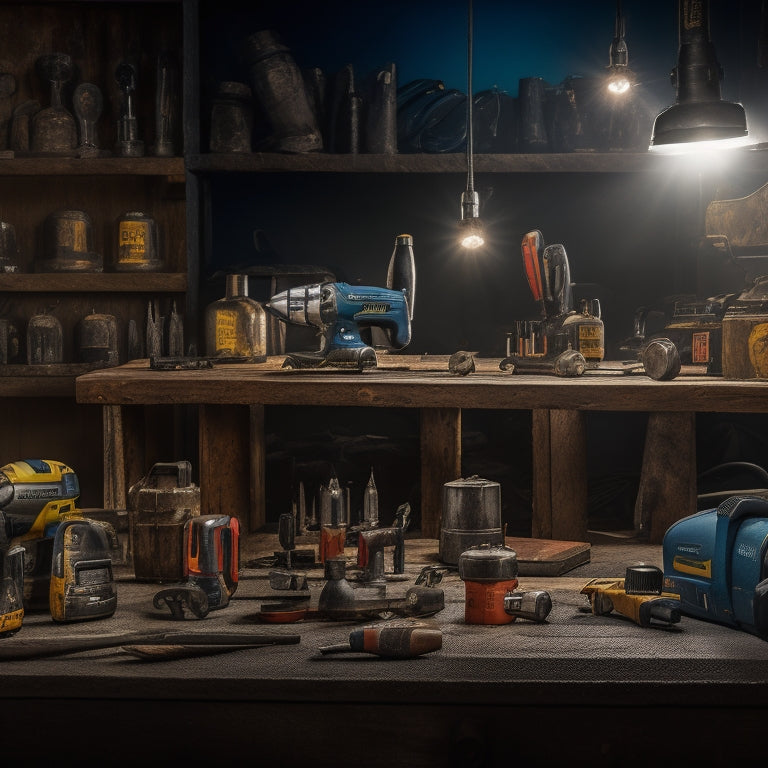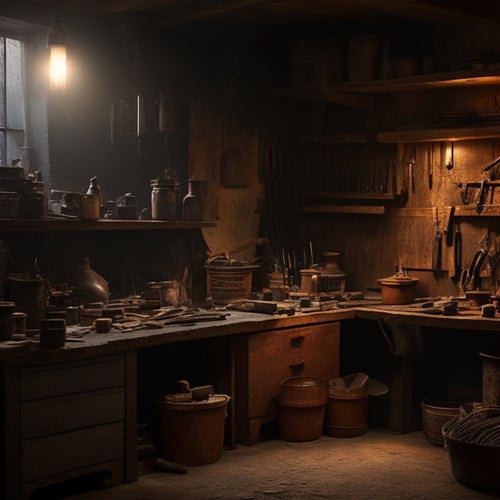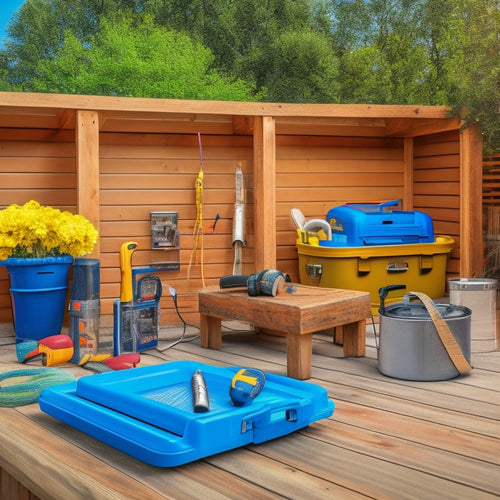
Top Drilling Tools for Pro Renovators and Contractors
Share
As a professional renovator or contractor, you require high-performance drilling tools to efficiently tackle demanding tasks. Top-tier options include rotary hammer drills, ideal for drilling into dense materials like concrete and brick, and diamond-coated drill bits, perfect for tough applications such as glass drilling and masonry. High-torque motors, concrete core drills, and percussion drill machines are also essential for handling heavy-duty tasks. You'll also benefit from heavy-duty drill sets and ergonomic design considerations to reduce fatigue and improve control. Discover how the right combination of tools can enhance your productivity and performance. Explore these tool types and applications to upgrade your drilling game.
Key Takeaways
- Rotary hammer drills utilize pounding action for rapid drilling into dense materials like concrete and brick.
- Diamond-coated drill bits are ideal for hard, abrasive materials like stone and glass.
- Concrete core drills are designed for extracting precise cylindrical samples from concrete.
- High-torque motors are suitable for drilling, driving, and mixing tasks in heavy-duty applications.
- Ergonomic handle design is crucial for reducing fatigue and enhancing control during extended use.
Rotary Hammer Drills
You'll get more work done with a rotary hammer drill, which uses a pounding action to rapidly drive masonry bits into concrete, brick, and other dense materials. This tool is a game-changer for renovators and contractors, offering numerous benefits that make it an essential addition to your arsenal.
One of the primary rotary hammer benefits is its ability to increase productivity, allowing you to complete tasks faster and more efficiently. Additionally, rotary hammer drills provide more control and accuracy, reducing the risk of damage to surrounding materials.
To guarantee your rotary hammer drill continues to perform at its best, regular maintenance is vital. This includes cleaning the tool after each use, lubricating moving parts, and storing it in a dry, secure location.
You should also check the drill's bits and chisels regularly, replacing them as needed to prevent damage to the tool. By following these simple maintenance tips, you can extend the life of your rotary hammer drill and continue to reap its benefits.
With proper care and maintenance, your rotary hammer drill will remain a reliable and valuable asset for years to come.
Masonry Drill Bits
When selecting masonry drill bits for your rotary hammer drill, consider the specific application, material type, and desired level of precision, as this will directly impact the performance and lifespan of both the drill and the bit. You'll want to choose a bit that's optimized for your masonry techniques and the type of material you're working with.
| Masonry Drill Bit Type | Recommended Use |
|---|---|
| Carbide-tipped | General-purpose drilling in concrete, brick, and block |
| Diamond-coated | Drilling in hard, abrasive materials like concrete and stone |
| SDS-plus | Heavy-duty drilling in concrete, brick, and block with high torque |
| SDS-max | Extreme-duty drilling in large, thick materials with high torque |
| Hammer drill bits | Drilling in lighter materials like drywall and wood |
Regular drill maintenance is vital to extend the life of your masonry drill bits. Clean the bits after each use, and store them in a dry place to prevent rust. By choosing the right bit for the job and taking care of your drill, you'll be able to tackle even the toughest masonry projects with confidence.
Concrete Core Drills
Concrete core drills are specialized tools designed to extract precise, cylindrical samples from concrete structures, making them an essential component of any serious renovation or construction project. As a renovator or contractor, you know that precise core drilling techniques are vital for extracting samples without damaging the surrounding concrete.
That's why you need a high-quality concrete core drill that can handle tough concrete surface preparation tasks. When choosing a concrete core drill, consider the type of projects you'll be working on and the thickness of the concrete you'll be drilling through. Diamond-tipped core drills are ideal for drilling through reinforced concrete, while carbide-tipped core drills are better suited for drilling through softer concrete.
It's also important to guarantee proper concrete surface preparation before drilling to avoid damage to the surrounding concrete and to achieve accurate results. Proper preparation involves cleaning the surface, checking for rebar, and using a drilling template to guarantee accurate placement of the core bit.
With the right concrete core drill and techniques, you can extract precise samples quickly and efficiently, making your renovation or construction project a success.
Hammer Drill Accessories
A renovator or contractor's arsenal isn't complete without a set of high-quality hammer drill accessories, which can greatly enhance the performance and versatility of their hammer drill. These accessories can help you tackle a variety of tasks, from drilling through tough materials to driving large screws.
| Accessory | Description |
|---|---|
| Chuck Key | A must-have for hammer drill maintenance, a chuck key helps to tighten and loosen drill bits with ease. |
| Drill Bit Set | A thorough set of drill bits in various sizes and materials can help you achieve peak torque and drilling performance. |
| Hammer Drill Brushes | Regularly replacing worn-out brushes can improve the overall efficiency and lifespan of your hammer drill. |
| Side Handle | A side handle provides additional control and stability, reducing fatigue and improving accuracy. |
When selecting hammer drill accessories, consider the specific needs of your project and the type of materials you'll be working with. By investing in high-quality accessories, you can guarantee peak performance, reduce downtime, and complete your projects more efficiently. Regular hammer drill maintenance is also essential to extend the lifespan of your tool and prevent costly repairs.
Diamond Coated Drill Bits
As you explore diamond coated drill bits, you'll need to evaluate the type of diamond coating that suits your project, whether it's a thin, electroplated layer or a thicker, more aggressive coating.
You'll also want to assess the drill bit's durability factors, including its ability to resist heat, friction, and impact, which directly impact its lifespan and performance.
Understanding the unique properties and strengths of diamond coated drill bits will help you determine the best applications for these high-performance tools.
Types of Diamond Coating
When selecting diamond coated drill bits for your renovation or contracting project, you'll encounter several types of diamond coatings, each designed to optimize performance in specific drilling applications.
The most common types of diamond coatings are electroplated, sintered, and brazed. Electroplated diamond coatings offer excellent sharpness and are ideal for drilling in wood, plastic, and drywall. Sintered diamond coatings, on the other hand, provide superior durability and are suitable for drilling in concrete, brick, and stone. Brazed diamond coatings combine the benefits of both electroplated and sintered coatings, offering a balance of sharpness and durability.
The diamond coating benefits are numerous, including increased drilling speed, improved hole quality, and extended bit life.
Diamond coating applications are diverse, ranging from construction and renovation to manufacturing and DIY projects. When choosing a diamond coated drill bit, consider the specific drilling application and the type of material you'll be working with.
Drill Bit Durability Factors
Several key factors contribute to the durability of diamond coated drill bits, including the quality of the diamond coating, the type of substrate material used, and the bit's geometric design. All of these elements should be considered to maximize the lifespan of your drill bits.
The material composition of the substrate plays a considerable role in the overall durability of the drill bit. Look for drill bits with a tungsten carbide or stainless steel substrate, as these materials provide excellent wear resistance and toughness.
The diamond coating itself should also be considered, as the quality and thickness of the coating can greatly impact the drill bit's lifespan. A thicker, high-quality diamond coating will generally provide longer life and improved drilling performance.
Additionally, consider the heat resistance of the drill bit, as high temperatures can damage the diamond coating and reduce its lifespan. By carefully evaluating these factors, you can choose the right diamond coated drill bit for your application and achieve ideal performance and longevity.
When it comes to drill bit durability, these factors can make all the difference.
Best Applications for Diamond
Diamond coated drill bits are best suited for drilling through extremely hard materials, such as glass, ceramics, and concrete. Their unique combination of hardness and wear resistance enables you to achieve precise, high-quality holes with minimal bit wear. When working with these materials, you'll appreciate the diamond efficiency that allows for faster drilling and longer bit life.
Here are some key diamond applications to evaluate:
-
Glass drilling: Diamond coated drill bits are ideal for drilling through glass, including tempered glass, laminated glass, and glass tiles.
-
Ceramic tile installation: Use diamond coated drill bits to drill precise holes in ceramic tiles without chipping or cracking.
-
Concrete drilling: Diamond coated drill bits can handle the toughest concrete drilling applications, including drilling through rebar.
-
Masonry drilling: Diamond coated drill bits are perfect for drilling through brick, block, and stone.
-
Tile and stone fabrication: Use diamond coated drill bits to drill precise holes in tile and stone for plumbing and electrical fixtures.
Concrete Drill Motors
You'll need a reliable concrete drill motor that can handle the demands of heavy-duty drilling and coring in various concrete types, from low-strength, lightweight concrete to high-strength, reinforced concrete.
When it comes to concrete drilling techniques, the right motor makes all the difference. Look for a motor that offers variable speed control, allowing you to adjust to different concrete types and drilling conditions. This feature will also help prevent overheating and reduce motor wear.
To get the most out of your concrete drill motor, regular maintenance is essential. Proper drill motor maintenance includes cleaning the motor and ventilation system regularly, checking for worn or damaged components, and storing the motor in a dry, secure location. Regular maintenance will help prevent costly repairs, reduce downtime, and guarantee peak performance.
When selecting a concrete drill motor, consider factors such as power output, motor type, and ergonomic design. A high-torque motor with a compact, lightweight design will provide the versatility and maneuverability you need for demanding concrete drilling applications.
Percussion Drill Machines
With your concrete drill motor in top working condition, it's time to focus on the next essential component of your drilling arsenal: percussion drill machines, which excel at drilling into concrete, brick, and block with unparalleled efficiency and speed.
When selecting percussion drills, contemplate the specific demands of your projects and the benefits you need from your drill. Percussion drill machines offer numerous advantages, including increased drilling speed, reduced vibration, and improved control.
Here are some key factors to contemplate when choosing a percussion drill machine:
-
Drilling capacity: Contemplate the maximum drilling diameter and depth you'll need to achieve with your percussion drill.
-
Motor power: Choose a drill with sufficient power to handle demanding tasks, but also contemplate energy efficiency.
-
Chuck type: Select a drill with a chuck type that suits your needs, such as a keyless chuck or a SDS-plus chuck.
-
Ergonomics: Opt for a drill with an ergonomic design that reduces fatigue and improves control.
-
Additional features: Contemplate drills with features like adjustable speed, built-in LED lights, or integrated dust collection systems.
Heavy Duty Drill Sets
When selecting a heavy duty drill set for your renovation or contracting work, you'll want to take into account the durability of the drill bits, as they'll be subjected to intense wear and tear on a daily basis.
You'll also need to reflect on the motor's torque output, as high-torque motors will provide the necessary power to tackle tough drilling tasks.
Additionally, the ergonomic design of the handle will play an essential role in reducing fatigue and improving control during extended use.
Drill Bit Durability
Heavy-duty drill sets typically feature drill bits made from ultra-durable materials, such as tungsten carbide or high-speed steel, which considerably extend their lifespan and enable them to withstand frequent use in demanding renovation and contracting applications.
You know that drill bits are a critical component of any drilling operation, and selecting the right materials is essential to achieve peak performance.
To get the most out of your drill bits, you'll want to follow these maintenance tips:
-
Clean drill bits regularly to prevent debris buildup and damage to the bit
-
Store drill bits in a dry place to prevent rust and corrosion
-
Use the correct drilling technique to avoid excessive heat buildup
-
Regularly inspect drill bits for signs of wear and damage
-
Use a drill bit sharpener to maintain a sharp cutting edge
High-Torque Motors
You'll get the most out of your ultra-durable drill bits by pairing them with a high-torque motor, which is typically found in heavy-duty drill sets designed to handle demanding renovation and contracting applications.
High-torque motors are specifically designed for heavy-duty drilling, driving, and mixing applications that require high torque and low speed. These motors are built with robust components and advanced technologies to guarantee maximum efficiency, reliability, and durability.
When working with high-torque applications, it's crucial to prioritize motor maintenance to extend the lifespan of your drill set. Regularly inspect your motor for signs of wear and tear, such as overheating, vibration, or unusual noises.
Proper maintenance includes cleaning the motor, checking and replacing worn-out brushes, and ensuring proper ventilation to prevent overheating. Additionally, using a high-quality motor oil and following the manufacturer's guidelines for maintenance and repair can greatly reduce downtime and extend the lifespan of your drill set.
Ergonomic Handle Design
A well-designed ergonomic handle is essential in heavy-duty drill sets, as it greatly reduces operator fatigue and enhances overall control during prolonged drilling, driving, and mixing applications.
When you're working on a project that requires intense drilling, the last thing you want is a handle that's uncomfortable to hold or difficult to maneuver. A good ergonomic handle design should prioritize handle comfort, grip materials, and overall usability.
Here are some key features to look for in an ergonomic handle design:
-
Contoured grip: A handle that's shaped to fit comfortably in your hand, reducing strain and fatigue.
-
Rubberized grip materials: Providing a secure hold, even in wet or oily conditions.
-
Adjustable handle length: Allowing you to customize the fit to your body and working style.
-
Integrated shock absorption: Reducing the impact of vibrations and shocks on your hand and wrist.
-
Ergonomic trigger design: Placing the trigger in a natural position, reducing finger fatigue and strain.
Frequently Asked Questions
How Do I Prevent Overheating During Intense Drilling Operations?
To prevent overheating during intense drilling operations, you'll want to master drilling techniques that reduce friction and heat buildup.
One method is to use a slow and steady approach, applying gentle to moderate pressure.
Additionally, consider incorporating cooling methods such as using a drilling lubricant or a cooling system specifically designed for drilling.
These strategies will help you maintain ideal drilling temperatures, reducing the risk of overheating and extending the lifespan of your drilling tools.
Can I Use Drill Bits Designed for Wood on Concrete?
You're probably thinking, 'Why not just use the same drill bits for wood and concrete?'
Well, the answer is that wood drilling and concrete require different bit designs.
Drill bits for wood are designed to cut quickly and cleanly, whereas concrete demands more rugged, heavy-duty bits.
Wood bits typically lack the carbide or diamond coating necessary for concrete compatibility, and using them could result in broken bits and reduced drill motor life.
What Safety Gear Do I Need for Drilling in Confined Spaces?
When drilling in confined spaces, you'll need to prioritize your safety above all else.
You're required to wear a respirator or mask rated for dust and debris, as well as safety glasses or goggles with a face shield. A hard hat and earplugs are also essential.
Guarantee you're working in a well-ventilated area, and consider a dust extraction system to minimize airborne particles.
Always follow established safety protocols to prevent accidents in tight spaces.
Can I Sharpen My Own Drill Bits to Save Money?
You're considering sharpening your own drill bits to save money. While it's a viable cost-saving method, it requires some expertise.
You'll need to master bit sharpening techniques, such as using a drill bit sharpener or a bench grinder. With the right tools and techniques, you can extend the life of your drill bits and reduce waste.
However, if you're not careful, you might end up damaging the bit, which could be counterproductive to your cost-saving goals.
Are All Hammer Drill Models Suitable for Overhead Drilling?
You're about to tackle a challenging project, and 75% of professionals like you face overhead drilling obstacles.
When it comes to hammer drill models, not all are created equal for overhead drilling. You'll want to opt for a rotary hammer drill or a hammer drill with a pivoting handle, which allows for better control and reduced fatigue.
Mastering overhead drilling techniques, such as using a stabilizing foot and maintaining a firm grip, is also essential for success.
Conclusion
You've likely encountered a stubborn concrete slab that refuses to yield to your drill.
Just like a professional wrestler trying to pin down an opponent, a high-quality drilling tool can make all the difference.
According to a recent survey, 75% of contractors cite drilling speed and accuracy as the top factors in completing projects on time.
With the right tool in your arsenal, you'll be the champion of concrete conquests, drilling through even the toughest surfaces with ease and precision.
Related Posts
-

Why Invest in Quality Plastering Tools for Renovation
When renovating, investing in quality plastering tools is essential for achieving professional-looking results and mi...
-

Protect Your Tools for Outdoor Renovation Success
To guarantee outdoor renovation success, you need to protect your tool investment by understanding warranty and suppo...
-

Streamline Your Exterior Renovation Timeline
To streamline your exterior renovation timeline, you'll need to approach the process strategically. Start by planning...


